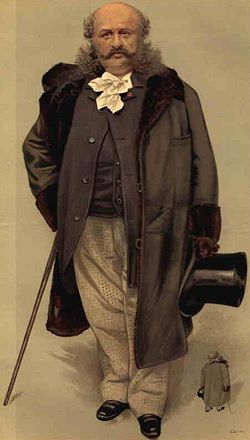- Henri Blowitz
-
 Blowitz by 'Ape' (Carlo Pellegrini) in Vanity Fair magazine dated 7 December 1889
Blowitz by 'Ape' (Carlo Pellegrini) in Vanity Fair magazine dated 7 December 1889
Henri Georges Stephane Adolphe Opper de Blowitz (28 December 1825-18 January 1903) was a Bohemian journalist.
He was born to a family of Jewish ancestry at Blovice (Blowitz) in Bohemia, and left home at the age of fifteen to travel, acquiring a wide range of languages in the process. When financial constraints led him to plan emigration to America, he met by chance M. de Falloux, the French minister responsible for public education, and was appointed professor of foreign languages at the Tours Lycée in around 1849. He thereafter transferred to the Marseilles Lycée. He resigned his professorship there in 1859 when he married in order to devote himself to literature and politics.
When, in 1869, Ferdinand de Lesseps ran for election as deputy from Marseilles, Blowitz became involved in a scandal due to supplying information to a Legitimist newspaper. This led to calls for his expulsion from France, which he countered by retiring to the country. The next year, the calls began again, as he began to predict the collapse of the Empire during the Franco-Prussian War; this time, he evaded them by naturalising as a French subject whilst the Battle of Sedan was being fought.
Once naturalised, he returned to Marseilles, where he worked for Adolphe Thiers. He later worked gathering information for him at Versailles, and as a result Thiers offered him the French consulship at Riga. Shortly before he was to accept this, Blowitz became the assistant to Laurence Oliphant, the Paris correspondent of The Times, whilst the second correspondent was absent. When the second correspondent, Frederick Hardman, succeeded Oliphant, Blowitz remained as assistant, and when Hardman died in 1873 he himself became chief Paris correspondent.
 Henri Blowitz
Henri Blowitz
In this role he became famous, both as a journalist and for his insights into diplomacy. In 1875, the duc de Decazes, the Minister of Foreign Affairs, informed him of a confidential despatch from the French ambassador to Berlin, discussing German plans to attack France, and requested Blowitz publish an exposé; he did so, provoking a storm of public opinion, and effectively preventing any chance of the German intention being carried out. In 1877 and 1888 he successfully exposed internal conspiracies against the Republic.
His most famous achievement was in 1878, when he managed to obtain the text of the Treaty of Berlin and publish it at the very moment that the Congress of Berlin was finally signing it.
References
 This article incorporates text from a publication now in the public domain: Chisholm, Hugh, ed (1911). Encyclopædia Britannica (11th ed.). Cambridge University Press.
This article incorporates text from a publication now in the public domain: Chisholm, Hugh, ed (1911). Encyclopædia Britannica (11th ed.). Cambridge University Press.- This article incorporates text from the public domain 1907 Chamber's Biographical Dictionary.
External links
Categories:- 1825 births
- 1903 deaths
- 19th-century French people
- 19th-century Czech people
- French journalists
- Czech journalists
- Czech Jews
- French Jews
- French nobility
- French people of Czech descent
- People from Blovice
Wikimedia Foundation. 2010.
